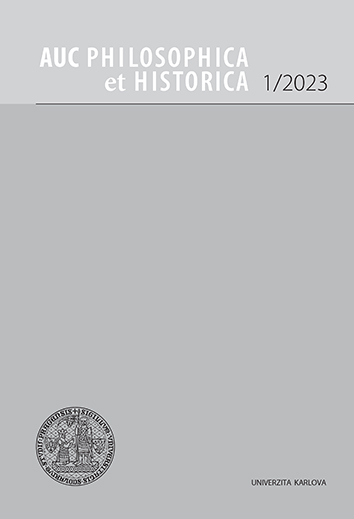AUC Philosophica et Historica (Acta Universitatis Carolinae Philosophica et Historica) is a multidisciplinary academic journal focused on the humanities with more than 50 years of tradition.
The journal is indexed in CEEOL, DOAJ, and EBSCO.
AUC PHILOSOPHICA ET HISTORICA, Vol 2013 No 1 (2013), 33–46
Patočkovy rozbory literárních děl a jejich vztah k Patočkově filozofii umění a dalším oblastem jeho myšlení
[Patočka’s Analyses of Works of Literature and Their Relation to Patočka’s Philosophy of Art and Other Fields of His Thought]
Daniela Blahutková
published online: 11. 01. 2015
abstract
Patočka’s Analyses of Works of Literature and Their Relation to Patočka’s Philosophy of Art and Other Fields of His Thought This article focuses on Patočka’s analyses of works of literature and presents these analyses first in relation to Patočka’s theoretical essays on art in general and on literature. Considering that, in several essays from the 1960s, Patočka discusses modern art from the perspective of his thesis about the difference between meaning in earlier art (the artistic era) and in contemporary art (the aesthetic era), the article pays special attention to his analyses of twentieth-century works of literature – Thomas Mann’s Doktor Faustus (1947), Jaroslav Durych’s Boží duha (written 1955; 1969), and William Faulkner’s Wild Palms (1939). He thus demonstrates that the analyses cannot be read as illustrations of Patočka’s theoretical essays on art and that they refer also to a number of other areas of Patočka’s thinking. The article demonstrates (1) how his interpretations of literary themes lead to analysis of concerns about being and to the conception of the existential movements connected with them; (2) how Patočka’s analyses are in harmony with his understanding of works of literature as ‘examples’, always clarifying, in a unique and specific way, what existence is; and (3) how literary subject matter for Patočka is always an historical statement that articulates the spiritual movements in the periods when it accompanies humankind in self-understanding. In conclusion, the article considers Patočka’s thesis about the problematization of meaning in modern art and the connected transformation of formal means (for which, however, there is little support in the essays that this article examines).
periodicity: 2 x per year
ISSN: 0567-8293
E-ISSN: 2464-7055
